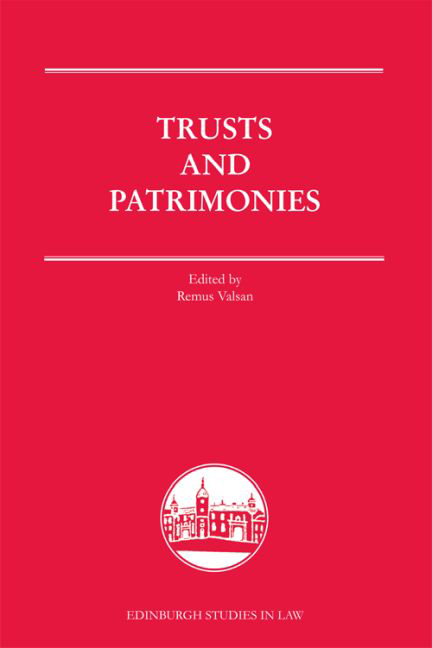Book contents
- Frontmatter
- Contents
- Preface and Acknowledgements
- List of Contributors
- List of Abbreviations
- Table of Cases
- INTRODUCTION
- PART I PATRIMONY AND THE COMMON LAW TRUST
- PART II PATRIMONY AND THE SCOTTISH TRUST
- PART III TRUST AND PATRIMONY IN FRANCE, QUEBEC AND THE NETHERLANDS
- 8 Translating Part of France's Legal Heritage: Aubry and Rau on the Patrimoine
- 9 Trusting Patrimonies
- 10 Dual Patrimony Dutch Style: The Magic Spell for Introducing the Trust in the Netherlands?
- Index
9 - Trusting Patrimonies
from PART III - TRUST AND PATRIMONY IN FRANCE, QUEBEC AND THE NETHERLANDS
Published online by Cambridge University Press: 15 September 2017
- Frontmatter
- Contents
- Preface and Acknowledgements
- List of Contributors
- List of Abbreviations
- Table of Cases
- INTRODUCTION
- PART I PATRIMONY AND THE COMMON LAW TRUST
- PART II PATRIMONY AND THE SCOTTISH TRUST
- PART III TRUST AND PATRIMONY IN FRANCE, QUEBEC AND THE NETHERLANDS
- 8 Translating Part of France's Legal Heritage: Aubry and Rau on the Patrimoine
- 9 Trusting Patrimonies
- 10 Dual Patrimony Dutch Style: The Magic Spell for Introducing the Trust in the Netherlands?
- Index
Summary
INTRODUCTION
The trust has always been part of Quebec civil law. However, its inherent English nature, combined with the little attention it received under the Civil Code of Lower Canada, created an uneasy institution in quest of an identity. The recodification of 1994 was the ideal moment to civilise the beast, and it was through the notion of the patrimony, a civilian notion if there is one, that this civilisation took place. The introduction of the patrimony by appropriation in the Civil Code of Quebec was prompted by the desire to recast the alien institution of the trust in a civilian framework.
But what are the consequences of the new patrimonialised trust? By choosing the patrimony by appropriation as the vehicle to integrate the trust into the most recent codification, the Quebec legislature has changed not only the framework of the trust, but also the overall juridical plan of private law. Rights according to the Civil Code of Quebec now have two means of being: either they belong to persons, or they are appropriated to a purpose.
The notion of patrimony is at the very heart of this conceptual revolution, which not only transforms all Quebec trusts into purpose trusts, but, more importantly, admits in Quebec's private law rights without holders. As I will try to demonstrate, this revolution was able to take place without a rebellion because the legislature used the notion of patrimony to recast the trust. The power of the patrimony over the civilian imagination managed to ease this conceptual turn.
The symbolic and normative power of the patrimony will be the main topic of this chapter. I will begin with a brief overview of the story of the trust in Quebec and try to explore why the patrimony, specifically the patrimony by appropriation, was chosen to recast the trust in the new code. I will then examine what it means to call a trust a patrimony and, more specifically, a patrimony by appropriation. To do that, I will first investigate the notion that seems to be fundamental to this profound change: the patrimony.
- Type
- Chapter
- Information
- Trusts and Patrimonies , pp. 199 - 220Publisher: Edinburgh University PressPrint publication year: 2015



